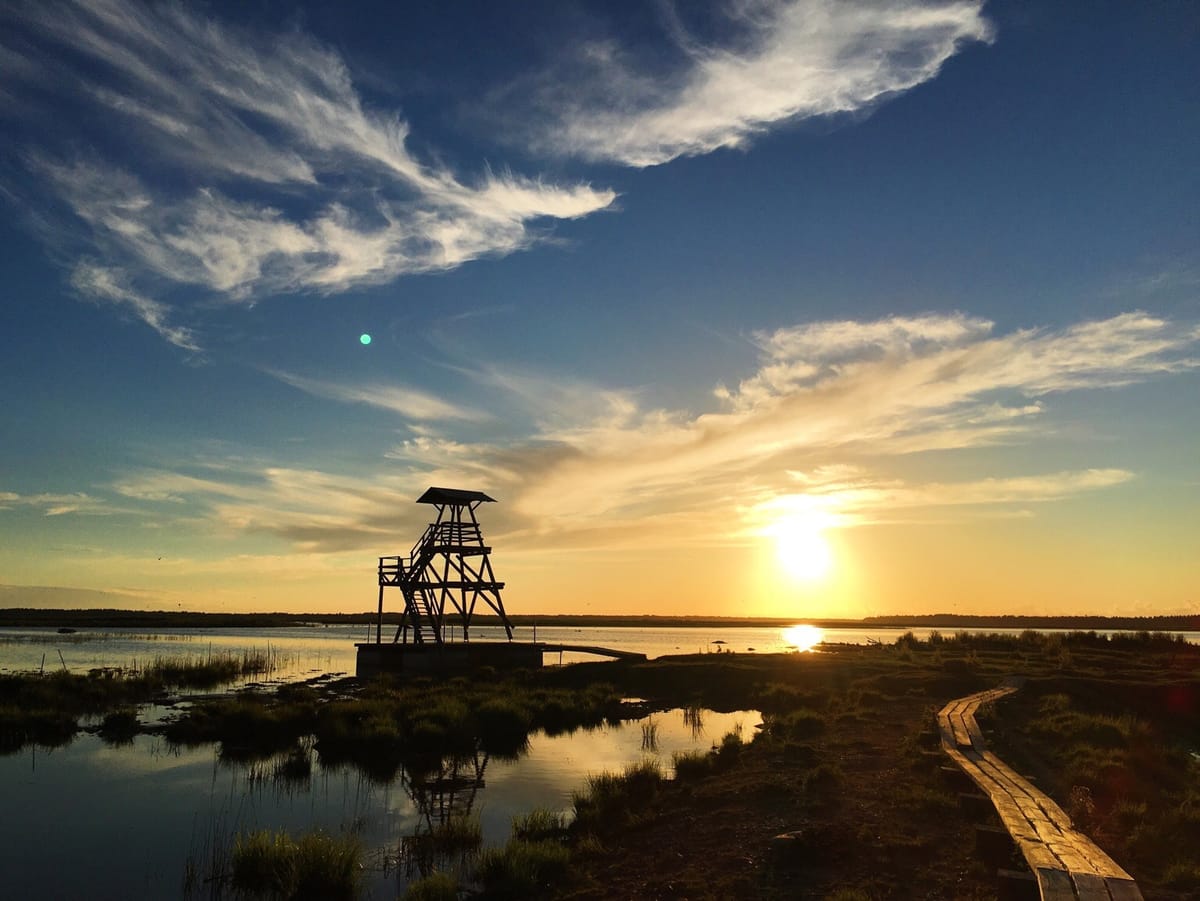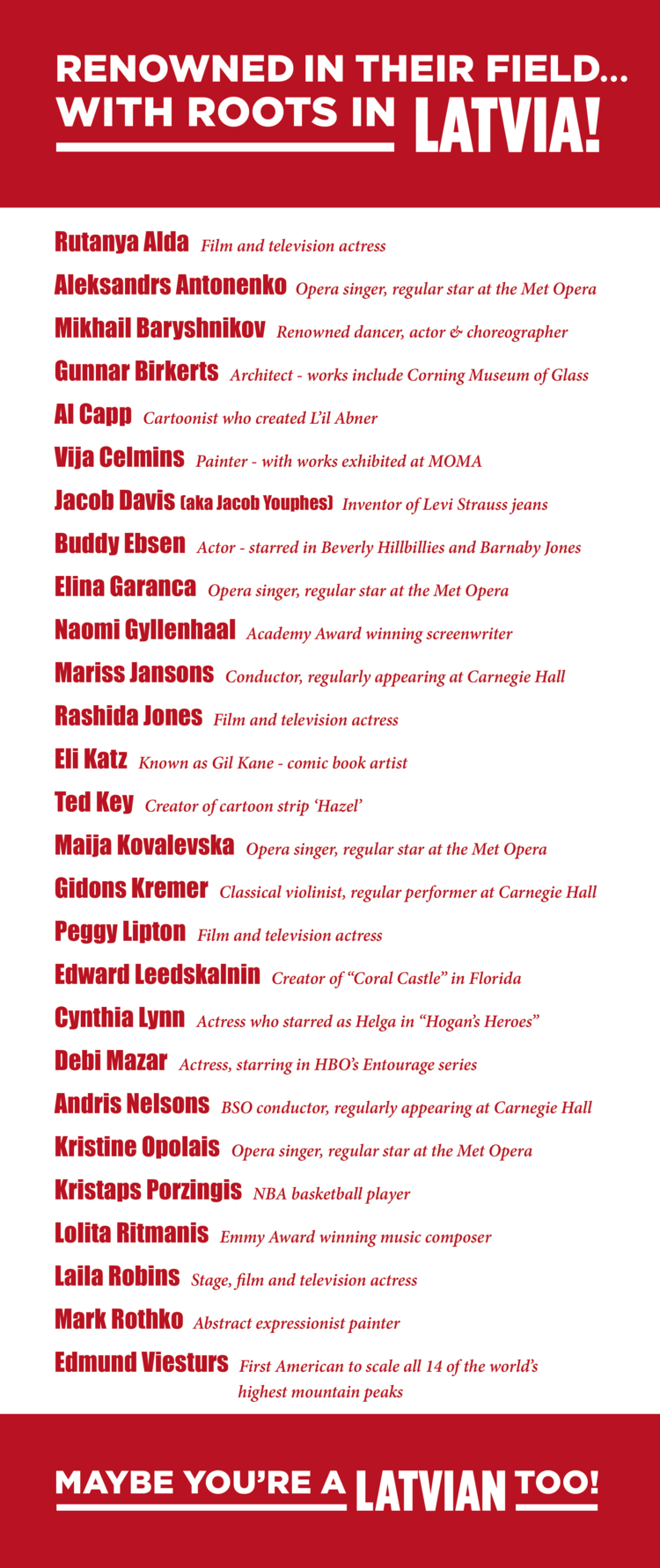Latvia Celebrates 100 Years of Independence

My home country, Latvia, is celebrating 100 years of (relative) independence this weekend, November 18th, so beg you to indulge me and join me in wishing Saules mūžu Latvijai (the lifetime of the sun for Latvia) and I’ll share with you a few things you may find interesting, and what neighbors have asked me about over the years of my living in Brooklyn.
There are only about 8,000 Latvians in the city of NY overall, and the social life in Brooklyn fell largely apart with the sale of the Latvian House in Park Slope. But there are plenty of Centennial events this year in the city, and Niagara Falls will turn red and white to celebrate tomorrow.
Latvia is a small country, about the size of West Virginia, in the North of Europe – one of the three Baltic States, tucked in between Estonia to the north, and Lithuania to the south, Belarus and Russia to the east. It is part of the European Union, NATO and has a long and complicated relationship with Russia. It is about 50% covered by forests.
Latvian is the national language, but most folks speak Russian as well as English and often another language. Latvian is not at all like Russian, and only really similar to Lithuanian. Only about a million people speak it, so I keep telling the kids its like a secret code. They say it is not easy.
Latvians love picking berries and mushrooms. I may be reinforcing a stereotype, but I like many, share in this national obsession. Some of my earliest memories are very vivid – thinking I was lost in a thick fir forest and calling for my parents. I was about 5, and not truly lost – they were just bent down picking mushrooms. (It is harder to get lost in pine forests, which are not quite as dense). Now we are developing drones to find those that do get lost, though orienteering is a popular sport, and folks have been known to combine it with mushroom picking:
We love to sing and dance. Every 5 years or so Latvians from across the world converge on their homeland to join locals for a massive song and dance festival, which this summer had almost 50,000 participants, and half a million spectators – imagine everyone running the New York Marathon on stage, singing or dancing. Quite a feat for a country whose population is just under 2 million, smaller than Queens.
However, you do not need to go all the way to Latvia to enjoy a Latvian singing – just visit the Met Opera house, where Aleksandrs Antonenko, Elīna Garanča, and Kristīne Opolais are performing this season, and Maija Kovaļevska and Marina Rebeka perform regularly.
Here are a few other famous Latvians, courtesy of the Latvian Embassy:

Christianity, and oppression, came late to Latvia.
Midsummer – celebrating the summer solstice – is still the biggest national holiday, with Winter and Spring solstices a close second.
German crusaders made their way north in the late 1100s and early 1200, and ruled the area inhabited by a collection of Baltic tribes for the next 700 years (as part of the Russian Empire for the last two hundred of those years) leading up to Latvian independence in 1918. For a brief 20 years, Latvia was independent, only to be occupied by Russia for the next 50 as part of the USSR. Almost every Latvian family had someone deported to Siberia during those years.
The year 1989 was a memorable one across the world, leading to restoration of independence in the Baltics in 1991 in what has been referred to as the Singing Revolution.
On August 23 of 1989, an estimated 2 million people across the three countries – Latvia, Estonia, Lithuania – joined hands forming an uninterrupted chain that stretched almost 600 kilometers, coordinated under Soviet oppression and without cell phones or social media.
These last 30 years of independence are the longest uninterrupted period of independence Latvia has ever had, and freedom has not been easy. Rapid growth was followed by a rapid collapse (GDP declined almost 18%), and harsh austerity measures, leading to many residents emigrating for jobs elsewhere in the EU, reducing the population from 2.4 million to less than 2 in about 10 years.
With Russia a constant threat along the eastern border and NATO troops present, a more visible reminder, Latvians are quite well trained at spotting propaganda (a kind of fake news promoted by the government, own or foreign). RE: Baltica does amazing investigative journalism if you want to understand what’s really going on.
I’ll say it again – I hope the next 100 years for Latvia are a bit easier than the last 100 have been.
And now onto to food:
If you want to find Latvian food in Brooklyn, your best bet is to head to my favorite store – Net Cost Market (the one at 3100 Ocean Avenue is open 24/7), which stocks all you need to throw a proper feast.
- Double smoked bacon for pīrādziņi and soups
- Sorrell year round for Skābeņu zupa
- Bread, European butter, sour cream, biezpiens …
- Pickled mushrooms, a number of varieties
- They have half sour pickles, and Kirby cucumbers to make your own year round
- Kaija herring, Riga sprats and an excellent selection of locally smoked fish and meats
- And you can pick up the salads for the cold dishes right from the prepared foods section – they are spot on.
- Cielaviņa is right by the bakery section, as is honey cake (meduskūka) and Laima chocolates.
- They stock Latvian beer
- Kārums (in at least 6 flavors) is available at the dairy section.




